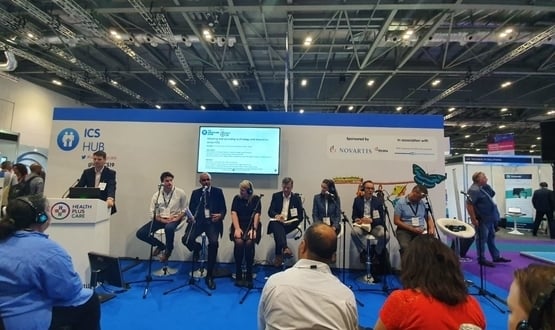Innovation can be new approaches not just ‘shiny new devices’
- 26 June 2019

Innovation in the NHS doesn’t have to be a ‘shiny’ new device or product – it can also be a method or new approach, it has been said.
Speaking at the Digital Healthcare Show at Health Plus Care in London, Henry Ireland, an innovation advisor, gave the audience his four tips to drive change in the healthcare sector.
As part of a panel discussion on adopting and spreading technology across integrated care systems (ICS), Ireland, of Imperial College Health Partners, said: “Innovation doesn’t have to be a shiny product of device, it can be a method or an approach.
“I say that, not because I think we don’t need the shiny innovations, but I think it’s much easier to overlook the stuff that is boring.
“My first boring tip on innovation is just giving it a go. I think we spend so much time in the NHS finding reasons not to work a little bit different, and there are plenty of good reasons for that, but we can’t hope to adopt these radical innovations if we aren’t willing to take really small steps in the way we work.
“My second point on innovation is to keep giving something a go. We are all too quick to pack something in when it hasn’t started to work immediately and we have to know when to stop things when they aren’t working but also to give enough time for innovations or our teams to form.
“That can be really difficult when we are getting a lot of pressure from our managers to deliver results, so if there’s anything to take home from this it’s: please give your teams enough time to deliver the innovations they’ve promised.”
Site visits and regularly meeting with other teams are a good way to learn from each other, he said, simply by getting out and seeing how others deliver care.
“That’s my next innovation: shadowing each other. We all think it’s a good idea but we rarely do it, so I would really encourage you to get stuck in and give that a go,” he added.
“The fourth is just spending time together. If you work through some of these pressure points you find you can do an awful lot more in the time you’ve got.
“It really difficult to build this case to adopt boring innovation when we are up against more exciting gadgets, but my hope is when we can start to develop better evidence in this space we will be able to provide a better case for doing this type of work.”
The theme was echoed across the panel, chaired by CCIO for health and social care in England, Simon Eccles.
Manuel Bosch, chief information and innovation officer at Ribera Salud Group said transformation should be about people before it’s about technology.
“The question is not ‘what’ or ‘how’, the question should be ‘why?’, why are we doing this to provide better care, or efficiency, or patient experiences,” he said.
“One important thing that we have learnt is that transformation is not about computers, it is about people.
Speaking in a keynote address earlier in the day Eccles said more CCIOs, CIOs, and CNOs were needed in the NHS in order for technology to streamline clinical processes.
“We are, this year, going to see our first HIMS Level 7 hospitals. We have comprehensive digitization of primary care, we are a world leader in that regard and through our Local Health and Care Record programme we have shown you can join care together in different localities,” he said.
“But what we have got to do, is spread that to every part of the NHS. We need locally placed shared records so, when I look somebody up, I am not seeing a thin slice of data relating to my own organisation… it relates to all aspect of their care.”




